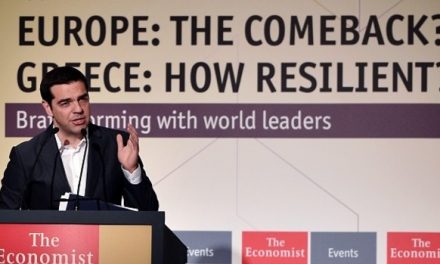By PANAGIOTIS MANOLAKOS AND ATHINA DRETTA, EuObserver
About seven years ago, Greece signed the first memorandum with international creditors. On 15 June, the completion of the second review of the third bailout programme was confirmed by the Eurogroup and an €8.5 billion tranche of loans was approved.
Now, rumours fly that Athens wants to test the waters of the bond markets. Some could say that Greece is on a stable path to recovery but, if you scratch the surface, things are a bit different.
In reality, we have once more only kicked the can down the road.
The Eurogroup deal includes pension cuts and tax increases that will be implemented in 2019 and 2020.
That means Alexis Tsipras will stay on as prime minister of the Syriza-Anel populist coalition for at least another year, and the Germans will not have another Greek drama during their elections in September.
For many Greeks, it seems that it has become an endless and futile time of suffering, just like the daughters of Danaus in Greek mythology, carrying water in a sieve.
Water in a sieve
The programmes, so far, were exactly like the sieves – they weren’t made for carrying water. In other words, if we want to successfully “carry the water,” we need a new “device” for that job, or, in our case, a paradigm shift.
That’s exactly what we want to propose, a new narrative that will combine the necessary fiscal targets with a vision of a new Greece. We strongly believe that this can be done in the context of the ongoing industrial revolution.
To be more specific, we think that several sectors of the Greek economy, combined with key elements of the current industrial revolution can boost the economy and create hope for the people that we can – finally – overcome this crisis.
The European Commission suggests that the “Industrial revolution aims to leverage differences between the physical, digital, and biological sphere. It integrates cyberphysical systems and the Internet of Things, big data and cloud computing, robotics based systems and additive manufacturing”.
The Greek government, alongside the commission, must work out a plan that will integrate the trends of this industrial revolution with sectors of the Greek economy – such as tourism, energy, food processing industry, agriculture – that are already developed, even if, in some cases, the productivity is relatively low.
At the same time, this plan will create a stable – and friendly – environment for new businesses, especially for those that will be focused on those dimensions of the industrial revolution.
In fact the adoption of that kind of strategy will really help Greece to make savings and meet the fiscal targets. Digital health care solutions, for example, can reduce costs and improve patient outcomes at the same time.
Smart solutions
That will also be an efficient way to free up resources, which can be used to reduce taxes or for investments – it can also be used for infrastructure. As well, it could – partially – be used to create a fund that would help the middle-aged unemployed people to develop the necessary digital skills or to start new businesses.
Agriculture is another example of how we could lay out such a plan.
It would be necessary to combine structural reforms. For instance, on one hand, there could be new forms of businesses in order to increase the average size of agricultural holding. And, on the other hand, there may be a focus on emerging technologies of the new industrial revolution – such as artificial intelligence, the internet of things – with the latest technology for weather, soils etc to boost productivity.
For such a plan to work, we need, first of all, political commitment. Greece must have the ownership of such a programme and, at the same time, will have to enjoy the full support of the troika of creditors.
The latter, among other things, means that the liquidity of the economy must be restored as soon as possible. Secondly, we must set our priorities (as we already described), realistic targets, implement the necessary reforms and invest in infrastructure that is essential for the new industrial revolution.
It’s also important to leave behind the rhetoric of “a battle between Greece and troika” that has been used by all governments except the one under Lucas Papadimos premiership in 2011-2012, and the images of “the lazy, corrupted Greeks who don’t do their homework” that several politicians and even bureaucrats in Europe have used.
Finally, it is crucial to win the support of the people by giving them a timetable. They must know what to expect, when to expect it and what to hope for.
Greece must not be left behind, and such a plan may be the best way to ensure that this does not happen.
Panagiotis Manolakos is a sociologist and a former prefectural counsellor of Athens. Athina Dretta is a dentist and a former deputy prefect of Athens and secretary general at the ministry of work and social security.



















